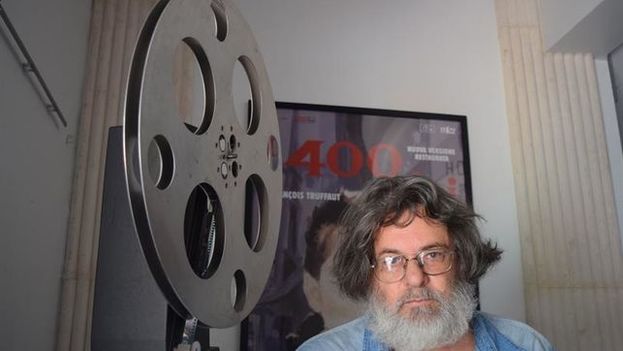
![]() 14ymedio, Mario Penton, Miami, 1 November 2017 — The film director, screenwriter and writer Eduardo del Llano has denounced that the Cuban television censors are hounding him and accuses the authorities of wanting to force him to emigrate.
14ymedio, Mario Penton, Miami, 1 November 2017 — The film director, screenwriter and writer Eduardo del Llano has denounced that the Cuban television censors are hounding him and accuses the authorities of wanting to force him to emigrate.
According to a statement written by the artist and shared through the social networks of Carlos Lechuga, the director of the also censored film Santa and Andrés, “it is not a matter of disavowing [Del Llano’s] specific content,” but of deciding to bar the artist from the small screen.
“Over the past three years, several members of the Vivir del cuento team, including the director and the best-known actors, had asked me to write for the program,” says Del Llano, born in Moscow in 1962.
The artist had warned the cast of the popular comedy program that delivers social satires in prime time on Mondays, that in 2015 another television director had contacted him for a summer program “and the program was taken off the air,” telling him the screenwriter was forbidden on television.
Del Llano has been a co-writer of important Cuban films such as Alice in Wonderland (1991) and Ana’s Movie (2012). Producer of more than 20 short films, in 2004 he stoked the cultural censors’ hatred against him by deciding to launch the Sex Machine Productions label with a series of short films about the national reality starring a character named Nicanor O’Donnell, who reflects the contradictions of daily life in Cuba.
The first of these films was called Monte Rouge and was a stark satire of the omnipresence of State Security in the life of Cubans. It was followed by others on information policy and various topics seen through satire. They were not released on television, but those shorts were widely disseminated through The Weekly Packet and USB flash drives.
Despite the warning, the director of Vivir del Cuento encouraged him to write a chapter of the saga of Pánfilo, the witty retiree who stars in the series and whose life revolves around the increasingly small assortment of products available through the ration book.
“A little more than a month later [the director of the series and another actor] called me, excited to let me know how much they had liked an episode that I presented to them, and to say that they were going to film it in October, along with three others by different authors,” says Del Llano, who clarifies that in the script he wrote for the program “he maintained the usual tone of social satire of Vivir del cuento but did not try to be particularly hard.”
However, in mid-October, according to the artist, “things went bad.”
The director of the television series called him “very distressed” and “saddened” to tell him that “from above” they had accepted the three other programs for the television series, but not the one written by Del Llano.
According to the artist, several members of the Vivir del Cuento team “are convinced” that “what is censored is not the specific work” but rather the writer. “I mean,” he says in a jocular tone, “that the Upper Television Spheres will continue to censor me even if I write Aunt Tata’s Storytime.”
“Excommunicating artists is a noble tradition of Cuban culture, especially on the tiny screen,” reflects the author and brings up the case of a film critic who had a regular space on Cuban television but who confronted “someone from above” and as a result will not be able to return to television, while a dozen already recorded programs were thrown away.
Del Llano clarifies that “until now” the actions against him are limited to Cuban Television and that with the Book Institute, the Humor Promotion Center, and even the Cuban Institute of Cinematographic Art and Industry his relationships “are reasonable and mutually respectful.”
“As you can see, the censorship is not even coherent,” he adds in an ironic tone.
The writer, however, regrets that “from above” they take away his opportunity to write for a television program that he considers a challenge in his career.
“How was it left? Without explanations to the team or to me, without anyone showing their faces and telling me why they condemned me in the first place,” he says and answers with a rhetorical question:” Do they want to leave me without options, force me to emigrate? Let them be the ones to go.”
